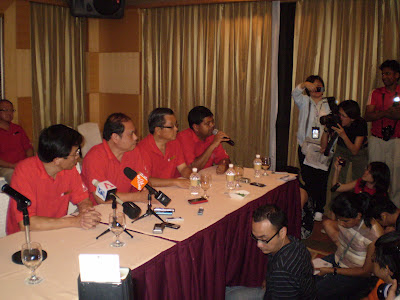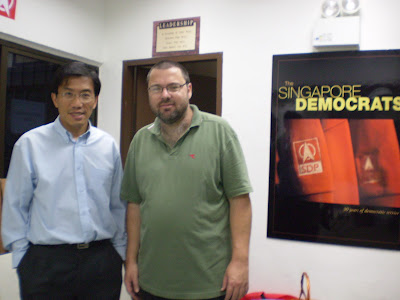Ten reasons why Dr Chee Soon Juan may win the Bukit Batok by-election:-
1. A changed man
Dr Chee has rejuvenated himself over the past decade changing from a unpopular activist regenade to a sober serious-looking politician.
Singaporeans prefer someone who is calm and stable to be in politics and he has rightfully transformed himself miraculously over the past ten years.
Gone is the tough-looking countenance of a hard-nosed activist as he went in and out of jail several times fighting for better human rights for our unappreciative Singaporeans.
The masses who flocked to his GE 2015 election rallies and long queues for his signature are testimony of his new-found popular success.
2. A straight-talking politician in Parliament
Singaporeans will be guaranteed a tough straight-talker in Dr Chee if he is elected into Parliament.
One who never refuses to speak his mind even if it jeopardises his own standing, he will certainly be the right person to speak out for the average Singaporean.
Many people are not too happy with the current performance of the elected Workers’ Party MPs in Parliament and they want to see someone who can debate articulately for them especially on unpopular policies that affect them.
Dr Chee may be the person we all are looking for…
3. Frustrated with 2rd PAP MP extra-marital nonsense
Singaporeans are shocked at the second PAP MP extra-marital affair that brought about the by-election.
Gone are the whiter-than-white image of the average PAP MPs and Bukit Batok residents may simply vote with their feet in protest.
Much time and money are lost in the process as the Election Department need to prepare for the folly of a wayward politician.
More importantly, there is a loss of confidence in the selection process of the ruling party as the illicit affair was allowed to carry on during and after the recent general election for close to six months.
No one blew the whistle until the husband threatened to complain to the ruling party.
Though an affair is tough to prevent as the grassroots needs to work closely with the MPs, a tougher protocol needs to be in place to prevent such extra-marital shame from happening again.
A third extra-marital incident will surely bring down the reputation of the PAP MPs though the second by-election has certainly damaged the image of the party by a few knots.
Residents at Bukit Batok may simply vote against the ruling party as a show of displeasure with the second extra-marital affair and more significantly its selection process.
4. By-election effect
The ruling party suffered a serious defeat at the first by-election at Punggol East in 2013.
People felt safe to vote in the opposition as the ruling party is already in power and there is no danger of a freak election result.
Though voters may generally be unhappy with the incumbent, they do not feel confident that the opposition can form a credible government which probably resulted in a landslide win for the ruling party in GE 2015.
However, a by-election does not bring forth such unpredictability and residents at Bukit Batok may simply do the impossible by giving Dr Chee a vote of confidence.
5. Renowned international speaker
Dr Chee is also a renowned international speaker and has far more exposure than anyone else from the opposition camp.
Most of his talks are full and well attended abroad as overseas participants want to pick the brain of the best opposition leader.
Thousands also attended the recent SDP rallies and many simply wanted to hear him speak.
Parliamentary speeches will never be the same again if Dr Chee is elected as a Member of Parliament as he is both gifted and eloquent in his delivery.
Ministers may dread it if he ever gets elected…he won’t take no for an answer.
6. Twenty over years in politics
No-one has stayed in politics as long as Dr Chee.
It must be at least an arduous 25 years and probably the longest unelected politician as well in Singapore.
It is a tough journey as his earlier years represent more of a activist role and the transition must be difficult.
Severely persecuted as a hard-nosed activist, he went in and out of prison frequently as his Western ethics went very much unappreciated by the average Singaporean.
He protested outside Parliament and even went on a hunger strike.
However, the transition over the past decade has transformed Dr Chee into a softer person whom Singaporeans are able to appreciate.
The personal transformation will surely touch some voters in Bukit Batok…
7. Second most prominent party in Singapore opposition
Dr Chee has managed to transform SDP into the second most prominent party in Singapore – no easy feat as no-one is in Parliament yet.
It's the daily grind over the past decade that touches many Singaporeans as the recent election results have been discouraging at best.
The unrewarded result must yield some dividends eventually and let's hope that the Bukit Batok by-election is the icing on the cake for the opposition incumbent.
8. Emergence of a second opposition party in Parliament
Singaporeans are starting to feel uncomfortable with just two parties in Parliament – the emergence of a third political party may be what they are waiting for.
SDP may fill in the missing gap on issues that WP want to abstain from.
For example, WP was decidedly silent on the passing of the population white paper three years ago and it was up to the activists who took the issue up at speakers’ corner triggering a large turnout for the event.
SDP is also seen to be more vocal on human rights issues which have irked many Singaporeans lately (Benjamin Lim’s suicide and Dominique Lee’s national-service death).
Singaporeans will surely welcome the more intense debate on issues if a second political opposition party enters Parliament.
9. Forgiven and forgotten
The ruling party and critics have always brought up the past in which the former SDP Sec-Gen Chiam See Tong was ousted by Dr Chee in a party power tussle.
But that was almost 15 years ago and much has evolved within the party during that time.
The ruling party will surely bring this up again to smear the name of Dr Chee and hope to knock back his rising popularity.
Nevertheless, what he has achieved over the past decade will negate any ill feelings created from the past.
10. Never-say-die character
Many are also amazed at the up-and-down chronology of the top-notched opposition leader who doesn't seem to give up.
After the recent landslide PAP win, many opposition leaders have taken a backseat more to lick their wounds than anything else.
However, Dr Chee never surrendered and continued with his 140-km personal walk for a better Singapore – just barely few months after the dismal election result.
It spoke volume of the staunch personality of the incumbent who is steadfast in his goal and ideals.
He has also given up much to be a politician as he has a doctorate in psychology. Surely, some foreign university would hire him as a lecturer and he could bring his family over for a better lifestyle but yet he stays on.
Let’s hope the voters in Bukit Batok give him a ticket to a dream seat in Parliament –
Singaporeans need him and he needs that opportunity to serve us.
Written by: Gilbert Goh
- See more at: http://www.transitioning.org/2016/03/19/ten-reasons-why-dr-chee-soon-juan-may-win-the-bukit-batok-by-election/#sthash.JOcTFAJ4.dpuf
[By Gilbert Goh and used here with his kind written permission.]
 |
| Dr Chee Soon Juan and Dr Kieran James @ old SDP Headquarters off Upper Thomson Road, February 2011 |
 |
| Dr James Gomez (far right) speaks @ SDP general election night function, Quality Hotel, May 2011 |
 |
| History in the Making: Dr Chee Soon Juan speaks @ SDP general election night function, May 2011, while Dr Vincent Wijeysingha watches BG George Yeo accept defeat in Aljunied GRC on the big screen. |
























.JPG)









